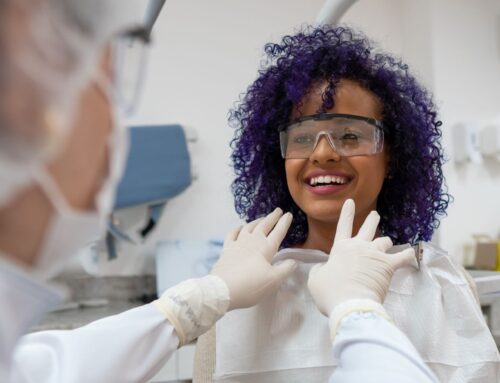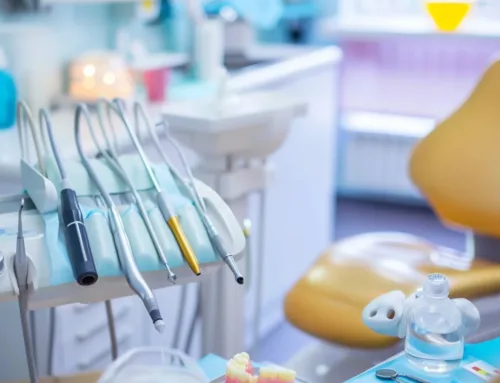Dental Health Benefits of Fluoride Treatments
For many decades, dentists have been treating patients with fluoride as a preventive measure to strengthen the teeth and reduce the risks of tooth decay. Throughout childhood, treatments using fluoride are performed during routine dental checkups to provide the greatest level of protection for the teeth as we mature. But, have you ever wondered how this mysterious substance actually works to shield your teeth against decay?
Take a quick look at any toothpaste label or bottle of antibacterial mouthwash, and you’ll likely see the word ‘fluoride’ listed prominently as one of the ingredients. Fluoride is an important part of preventive dental health care, as it is one of the most effective tools we have to reinforce our teeth, keep them strong, and protect them against the harmful effects of tooth decay.
While fluoride treatments are most commonly recommended for children, they are also a very important part of preventive dental care throughout adulthood as well. Understanding how fluoride works to provide these benefits first depends on defining what fluoride is, and how it reacts with the protective enamel coating on our teeth.
What Exactly Is Fluoride?
Fluoride is a stable compound that can be found naturally in the earth, and occurs when the element fluorine combines with other salts and minerals. Interestingly, the history of fluoride use in the world of dentistry is quite colourful, as it was not always certain that it was in fact a benefit to our health. Back in 1909, a joint research project in Colorado first started exploring the curious case of a town where residents inexplicably developed dramatic brown blotching and staining on their teeth. However, in spite of this visual discoloration, their teeth were observed to be surprisingly resilient to tooth decay, which was a widespread problem at the time.
During the investigation and research, virtually every possibility was evaluated, including looking closely at the town’s water supply. This yielded a breakthrough, as it was determined that the water used by the town had a higher than average concentration of fluoride in it. After correlating their findings from Colorado with similar situations in other towns in the USA, the researchers were able to ascertain that fluoride was the reason for the increased resistance to tooth decay.
These findings led to many other research projects to further explore the positive health effects of fluoride on teeth, and eventually took the form of a water fluoridation project in Grand Rapids, Michigan. Over a 15-year period, the drinking water for the city had trace amounts of fluoride added to it, and the effects were closely monitored. In just over a decade, the results were undeniable as instances of tooth decay dropped rapidly among children throughout the city. This research into the positive effects of fluoride on teeth was instrumental in the advancement of dental health worldwide by substantially reducing the frequency and severity of tooth decay in the general population.
What Causes Tooth Decay?
As strong and tough as our teeth are, they are not impervious or indestructible. They can gradually decay if not properly taken care of and eventually lead to lost teeth, infections, gum disease, and other dental health problems. Tooth decay occurs when the enamel of the teeth is worn down and eroded by the acids created as by-products of bacterial growth on the teeth and around the gums.
Bacteria builds up in the mouth in the form of plaque and tartar. Plaque is the sticky, smelly film that coats the teeth and tongue. Tartar forms when plaque becomes hard and bonds itself to the outer enamel of the teeth. These bacteria-ridden substances are usually removed by regular toothbrushing, flossing, and professional dental cleanings during your checkups.
However, if plaque and tartar are left untreated, the erosion of the tooth enamel accelerates, resulting in cavities and tooth decay. Some teeth are more susceptible to developing cavities and tooth decay, as they can be more difficult to reach and clean, such as the back molars and teeth that are very close together, misaligned, or crowded in the jaw.
Over time, tooth decay can develop further into more serious conditions like bacterial infection of the gums or interior tooth pulp. In cases like these, patients can experience pain, swelling, bleeding, loose teeth, and severe discomfort when eating and speaking. Tooth decay is a serious matter that should be dealt with promptly and effectively, but the best approach is to prevent it from occurring in the first place. To this end, fluoride treatments are an essential part of your dental health care.
How Does Fluoride Strengthen Teeth?
This may surprise you, but your teeth are in a constant state of change. Every day, when you brush your teeth, eat food, or take a drink, your teeth are going through a cyclical process of degradation and regeneration. The main strengthening elements of the enamel on your teeth are minerals such as calcium, phosphorus and magnesium. As your teeth come into contact with the acids produced in the mouth by bacteria and by saliva used to aid in digestion, these minerals are extracted from the enamel, thereby weakening it slightly.
When you brush your teeth using a fluoride toothpaste, or have a fluoride treatment at your dentist office, these minerals are absorbed and replenished in your tooth enamel. The fluoride compound works to speed up and improve the re-mineralization process for your enamel, infusing greater amounts of the minerals your teeth need to stay strong more efficiently. This beneficial regeneration process is cumulative, so the more often you brush with fluoride toothpaste or visit your dental clinic for a professional cleaning treatment, the stronger and more resistant to decay your tooth enamel will become.
How Are Fluoride Treatments Performed?
Professional fluoride treatments can be performed by your dentist or dental hygienist in several different forms. The two most common and popular methods of fluoride treatment are the use of a gel/foam fluoride compound applied using trays, or a brushed-on fluoride varnish.
With the gel/foam method, your dentist will apply a soft fluoride compound into arch trays and place them on your top and bottom teeth. You will then be instructed to gently close your mouth and keep them in place for a short period of time, usually about 3-4 minutes in duration. During this time, the concentrated fluoride compound will work to re-infuse the strengthening minerals back into your teeth. Once finished, the trays will be removed and you’ll likely be told to rinse your mouth using a mouthwash or water to clear away any leftover gel or foam.
If your dentist recommends a fluoride varnish instead, the process is even easier. A small brush will be used to coat the surfaces of your teeth with the fluoride varnish, which will then air-dry for a few moments. After the varnish is sufficiently dried, you’ll be allowed to leave the clinic and be on your way. It’s generally recommended that you avoid eating, drinking or brushing your teeth for a little while after the varnish has been applied so it has sufficient time to work properly, but otherwise you can resume normal daily activities. After the time recommended by your dentist has elapsed, you can safely brush away any remaining varnish residue from your teeth.
Fluoride treatments are fast and easy, and should be performed regularly according to the recommendations of your dentist. Children in particular are most at risk of tooth decay, however fluoride treatments are still something that should occur as part of the dental health care for adults as well. Reinforcing the strength of your tooth enamel to fight back against tooth decay has many ongoing health benefits, regardless of your age.
Complete Preventive Dental Care for Stronger, Healthier Teeth
To ensure that your teeth are as strong and healthy as they can be, always be sure to brush with a fluoride toothpaste, use antibacterial fluoride-infused oral rinses, floss regularly, and make sure to visit your dentist for the recommended schedule of professional cleanings and fluoride treatments. If you’re due for your next visit, let’s get that appointment booked today! We will be glad to arrange for a comprehensive review of your dental health and provide all the guidance and advice you need to keep your smile in style.
Georgian Dental is your full-service family dental clinic for patients of all ages. Our friendly staff makes dental care a positive experience for children from day 1, and we offer a complete range of dental procedures and treatments for the needs of your entire family. Preventive dental care, tooth extractions, braces & orthodontics, cosmetic dental treatments, dental implants, and so much more is available here at our Barrie and Orillia dental clinics. Contact us today to set your next appointment!
Appointment Request
If you’re interested in any of our procedures, and would like to meet with one of our dentists to discuss options, costs and get additional information, complete this short form and we’ll give you a call to arrange for a no-obligation appointment at our Barrie clinic.










